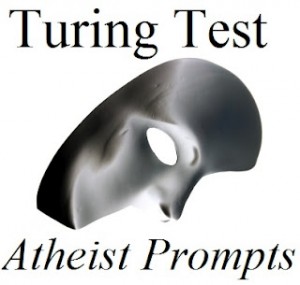This is the first entry in the Atheism round of the 2012 Ideological Turing Test for Religion. In this round, the honest answers of atheists are mixed in with Christians’ best efforts to talk like atheists. It’s your job to see if you can spot the difference. The voting link appears at the end of the entry, and you can look at all entries in this round here.
When (if ever) have you deferred to your philosophical or theological system over your intuitions?
I want to say that I usually defer to my philosophical system(s) over my intuitions. The world is deeply counterintuitive. I am currently learning a fair bit about biopolitics, and one thing I have picked up on is that we constantly want to think of power as centralized while in fact power is diffuse. We want to think it is rigid and hierarchical, but it is dynamic and reversible. Our (probably learned) intuitions are wrong. So in cases of examining how the world works, we should have a healthy skepticism of our intuitions. But in practice, this is not so easily the case. Social interactions are rapid and complex, and so long as you have internalized behaviour norms, operating intuitively rather than on explicit rules or constructs is by far the most effective method. Of course you should reflect on what happened afterwards and retool your intuitions as needed, but in situ trusting the less-than-conscious parts of your brain is sometimes better. In this case it is like fencing: you need to learn to suppress your intuition so that you can retrain it, because in a bout you cannot afford to think about the mechanics explicitly.
Are there people whose opinions on morality you trust more than your own? How do you recognize them? How is trusting them different than trusting someone’s opinion on physics?
People’s moral systems can often appear similar on the surface, but turn out to be grounded in entirely different attitudes. I am approximately INFJ and a friend of mine is more extroverted and thinking-based (for extraverted functions). While we are both concerned with morality and seem to agree on empathy’s importance, once we start hashing out specific problems we find we disagree foundationally. She thinks we need to be expressive and that we should strive for fairness. I think we should watch what we say and that we should strive for harmony. We sometimes resolve our conflicts, but even then we still disagree about why the action we have chosen is best. This is a variation on a perpetual theme. There is no one whose moral grounding is close enough to my own that I could defer to them, even when I think they are better moral reasoners than I am, because I disagree with their premises. Usually I do not even know what their moral grounding is. I generally admire Buddhists, though, and would seriously consider anything a lama or Zen master suggested (excluding heterosexism), though I still would not automatically trust them. I would need to inspect their premises.
Can you name any works of art (interpreted pretty broadly: books, music, plays, poetry, mathematical proofs, etc) which really capture the way you see life/fill you with a sense of awe and wonder? You can give a short explanation or just list a few pieces.
No work of art represents my views entirely. That would be difficult. Some of my epistemology resembles postmodernism, in that I do not think that “the truth” is accessible, or that “logic” could get us there. I use the quotation marks because I think that proximate truths are available and that reason is most useful in seeking them, but I do not think these are absolute or certain. Therefore I am hesitant to adopt any work of art as representing my view, because that’s too fixed. I am no nihilist or absurdist, however, and so postmodern or absurdist art does not represent me, either. Philip Pullman’s His Dark Materials and the film Agora represent my take on some organs of religion. But my views on religion are less important to me than other things. For example, Tom Stoppard’s Arcadia represents my take on knowledge, polite society, desire, love, and humour. Miyazaka’s films represent my take on childhood. Becket’s Waiting for Godot represents my take on misery and alienation. Shakespeare’s King Lear has a lot of duende for me, but I get my wonder from the Beaty Biodiversity Museum’s well-designed exhibits. (I once started crying a little over the Glaucus atlanticus.)
Click here to judge this entry, and, once you’ve voted, feel free to speculate and trade theories in the comments or look at other entries in this round.











